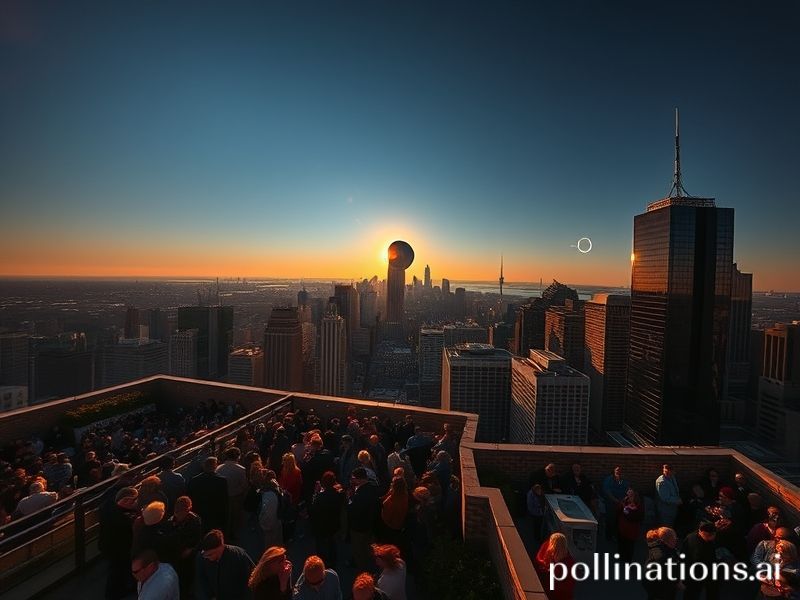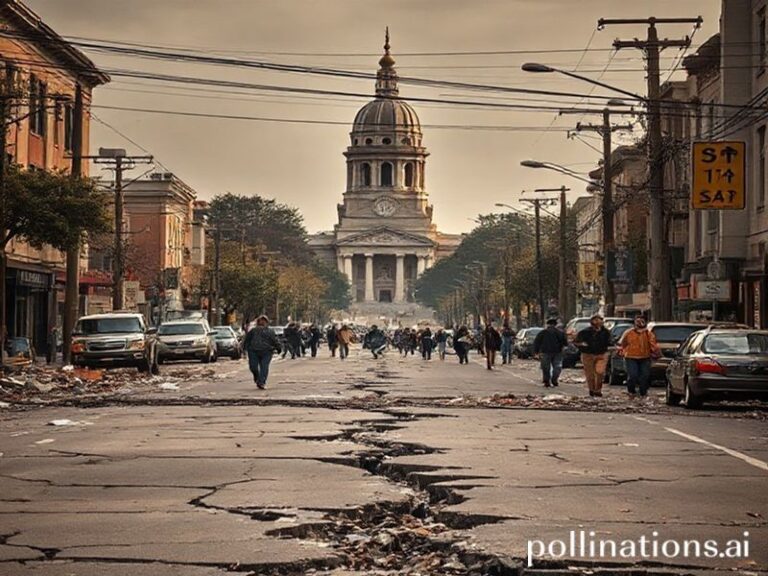Global Shadow Play: Tomorrow’s Eclipse Tours the Planet While Humanity Tries to Monetize Awe
Tomorrow, for roughly four minutes and twenty-eight seconds—just enough time for a bad first date or a decent espresso—the Moon will photobomb the Sun. The total solar eclipse will rip a 185-kilometre shadow across the Pacific, graze Easter Island’s blank-eyed moai like a celestial pickpocket, then sprint across Chile and Argentina before vanishing into the Atlantic like a politician’s promise. Roughly forty million people live inside the path of totality; another eight billion will watch it on screens, because nothing says “awe” like live-tweeting the apocalypse.
For the global tourism industry, the eclipse is Black Friday with better lighting. Chilean hotels have tripled prices; Argentine vineyards are selling “umbra” cabernet at a 400 % markup. Chinese eclipse cruises—complete with onboard astronomers and a commemorative panda mascot—sold out in nine minutes, proving that even cosmic phenomena need effective branding. Meanwhile, airlines have added “totality flights” at 30 000 feet, giving passengers the rare chance to pay economy-class prices for a view they could have had for free had they simply stood still.
The geopolitical class is not missing the optics. NASA is lofting WB-57 jets to study the Sun’s corona, apparently under the impression that the star needs more surveillance. The European Space Agency is piggy-backing a solar-weather experiment, because nothing calms continental anxiety like knowing exactly when the next Carrington Event might fry every transformer from Lisbon to Luleå. Over in Beijing, the State Council has issued a nationwide safety bulletin warning citizens not to stare at the Sun without proper eyewear—advice that doubles as a tidy metaphor for foreign policy.
Climate watchers, ever the life of the party, note that the sudden drop in solar radiation will cool the lower atmosphere by roughly 3 °C, a preview of what nuclear winter might feel like without the radioactive aftershave. Grid operators in Chile have spent months modelling the drop-off and surge of solar farms; Argentina, more relaxed, plans to fire up diesel generators and bill it as a tango between progress and nostalgia. In Brussels, bureaucrats are already drafting a white paper titled “Eclipse-Induced Transient Grid Stress: A Framework for Resilience,” which will be read by seven people and ignored by everyone with actual electrons to worry about.
Markets, those great interpreters of human fear and greed, have assigned a dollar sign to wonder itself. Futures in eclipse-viewing glasses—mostly manufactured in Shenzhen from last year’s recycled TikTok phones—spiked in March and are now sliding faster than a crypto rug pull. German insurers have quietly added “acts of totality” exclusions to travel policies, while Lloyd’s of London is offering bespoke coverage for satellites that might be damaged by the sudden thermal shock. Somewhere in a Goldman Sachs chat room, a junior analyst is pitching a structured product tied to coronal mass ejection probabilities; the prospectus is 87 pages long and contains the word “alpha” 312 times.
And then there is the human pageant. In San Juan, wedding planners are staging mass totality ceremonies—“Till shadow do us part.” In Tahiti, Instagram influencers are renting black horses to ride along the beach at second contact, because nothing says cosmic humility like a sponsored post captioned #ChasingDarkness. Back on Earth, a Reddit thread titled “Eclipse orgy locations” has 42 000 upvotes and counting, proving once again that when faced with the sublime, humanity’s first instinct is to schedule group sex and hope the Wi-Fi holds out.
When the last diamond ring fades and the birds start singing again, the planet will return to its regularly scheduled disasters: wars, wildfires, elections. But for one brief planetary moment we will all look up—some through ISO-certified polymer, some through tears, some through the cracked screens of dead phones—and share the same patch of darkness racing east at 3 700 kilometres per hour. It is, perhaps, the only border that still closes faster than a populist can tweet.
Enjoy the show. Wear the glasses. Try not to think about the fact that the next one won’t arrive until 2026, and by then the oceans may be busy swallowing the best viewing spots. In the meantime, may your skies be clear, your batteries charged, and your existential dread fully total.







